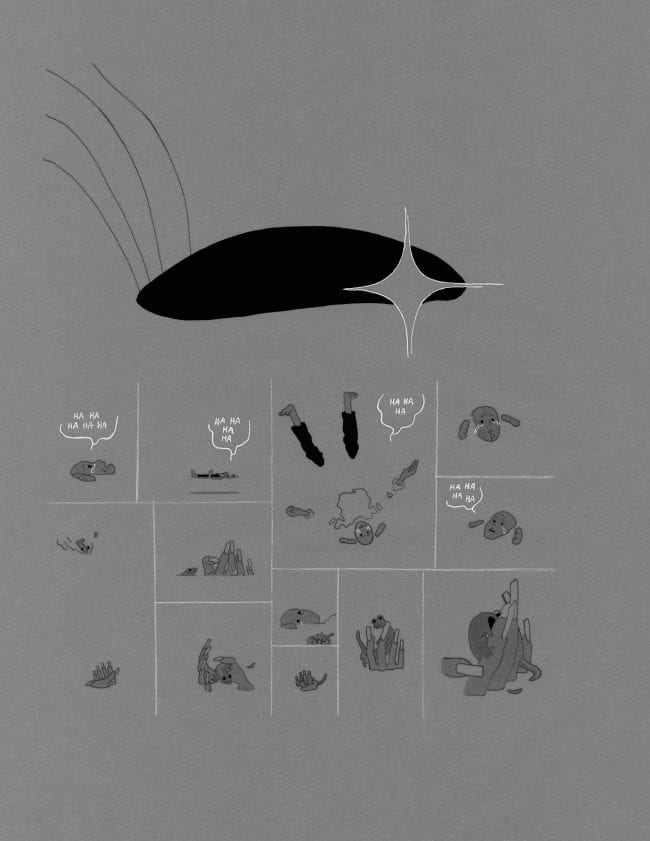I don’t like popcorn, but I buy it anyway. It’s theater-going praxis. The way my eyes adjust to the darkness as I release from reality, the manner in which I can instantaneously become more attuned with the people on screen than the ones selling Sprite in the hall — going to the movies is a great joy in my life. I try to find a seat where I can put my feet up on a bar and I eat my food before the movie starts to avoid any and all munching stimuli. Those are my rituals. That’s how I escape the real world.
My wife has no rituals. She considers going to the Cineplex a waste of time and money, finding no fondness for sticky floors. When the opening credits roll, she worries about all the time she could be spending doing absolutely anything else at all that interests her. She finds the aforementioned escape to be stressful, no matter how many Mike and Ikes you scarf down. Our relationship thrives, but that schism remains. Anti-Gone, a new graphic novel by Connor Willumsen, is about the gulf between two people and how they relate to a darkened, air-conditioned box with stadium seating. It’s about positioning privilege and diversion as sacred pastimes. It’s about all these things. At least I think so.
Spyda has terrible tattoos, wears a visor, and lives on his refurbished-couch-like sailboat. He can only relate to other people through movie quotes, but don’t worry, he’s getting professional help for that. Lynxa is his shipmate, sporting long finger nails, who seems to be jadedly reading and bronzing her life away in slow-motion. We know people like Spyda and Lynxa. They’re people we went to school with, old friends from back home or past lives. They’re here now, a fair-weather couple on an indifferent quest to get high, have sex, play hide-and-seek.
Willumsen sets Anti-Gone in a post-global-warming event society, fittingly neither completely depleted nor fully stable; cities are under water, but the economy is still humming. After being given free tickets to the luxury movie house, and obtaining nostalgia-expanding hallucinogenics, Spyda and Lynxa take in a violent, existential superhero flick. Outside, and intermittently during the course of the book, a battle between a large group of protestors and police who are exploiting their sadistic authority comes to a head. Just like the inattentive duo, we’re kept in the dark as to what this oncoming riot is ever about. The chemical-steeped trips the pair are on leaves them separated, and they never reunite. The sun rises, the sun sets. They go on, alone, trekking for distraction. Leisurely delights or anxious grievances — any sensation will do. This is what Anti-Gone is about. At least I think so.
For a while, I couldn’t make it past the cover. I read the book one, two, three times, but the front remained just as intimidating. It wasn’t the purple frame, or the metallic flourishes, but the tiny isle smack-dab in the middle, or more accurately, what happens to that piece of land when you flip the overlay. Now a white page, pure negative space, surrounds the palm trees in uncertainty. Willumsen uses that emptiness as a tool again and again throughout the book, most deftly as a fill-in for water.
The vastness of this open sea for the two main characters leads to sun-drenched tediousness and an unexpected shipmate in a man — or more accurately, a set of shifting eyes in a hard-boiled trench coat — who goes boat-to-boat selling essentials. For me, that same open-sea setting led to being enthralled with Willumsen’s vagueness and the confidence the artist has to lean into it.
On this early page, above, all of the ten panels take place wading in water, but liquid in its physical form is only rendered once. Also, noticed that hopeful sparkle on the calm surface.
Later on, water both serves as sinister symbol and a sign of solace. Lynxa takes one false step and falls into a dangerous abyss, but like on the page below, she also relishes in it after being violently separated from her companion and recently-acquired pet. We never truly know where the bottom lies due to Willumsen’s economy of line, but this also gives the void a massive amount of weight. Here, that glistening sparkle reappears with altered significance. From beginning to end, Willumsen pushes you in the deep end and forces you to tread over adroit uncertainty, using water as a stand-in for not only the fragile nature of nostalgia and relationships, but your very own mind. Anti-Gone is about all these things. At least I think so.
Although much of the story is intentionally indefinable, your fundamental artistic needs are still met. Through dialogue, Anti-Gone’s characters encompass the quiet frustration of miscommunication as Willumsen’s back-and-forths with the best of them. The acting skills displayed — how the characters sit, how they wear their sunglasses, how they act around animals — gives the couple a blend of boredom and melancholy that is all too familiar if you spend any time online. And then there’s the dog page; a slow-transit viewing of a canine in a window from the point of view of being on a boat. It operates as a revelation as much as a narrative palate cleanser and is sure to win the dubious award of “most swiped” during 2018’s imminent onslaught of zines. All these necessities are served up to us over the course of 120 pages, making Connor Willumsen the ideal comics concierge.
About half-way through, a long-winded drug-dealer explicitly tells Spyda and Lynxa, “I am only as good as you want me to be.” After I took the time to digest this book, I kept coming back to that one line. I wanted a comic of daring ambition and tremendous craftsmanship. Willumsen delivered. Nothing ambiguous about that.










